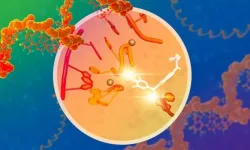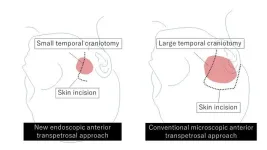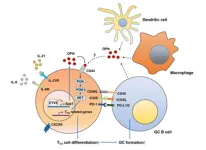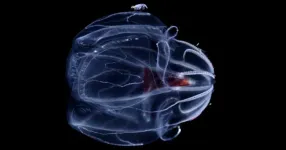New molecules to modulate gene expression
A new research paper published in Nature Communications lays the groundwork for the development of new drugs specific to genetic mutations or alterations responsible for the onset of tumours or genetic diseases
2024-07-02
(Press-News.org)
Genoa (Italy)/Grenoble (France) – 2nd July, 2024 - The correct functioning of cells relies heavily on the ability to finely control gene expression, a complex process by which the information contained in DNA is copied into RNA to eventually give rise to all the proteins and most of the regulatory molecules in the cell. If DNA can be imagined as a dense technical manual, gene expression is the method by which the cell extracts useful information from it.
Researchers at the Istituto Italiano di Tecnologia (IIT) in Genoa and the European Molecular Biology Laboratory (EMBL) in Grenoble have unveiled how this process can be modulated using small molecules. The study lays the groundwork for the future identification of potential drugs that act directly on genetic mutations or modifications which alter the process of gene expression, thereby targeting the onset of tumours or genetic diseases.
The research paper, published in Nature Communications, was coordinated by Marco De Vivo, Principal Investigator of the Molecular Modeling & Drug Discovery Lab and Associate Director for Computation at IIT in Genoa, and by Marco Marcia, Group Leader at EMBL Grenoble. The results were achieved by integrating EMBL’s and the Partnership for Structural Biology’s expertise in biochemistry, biophysics, and structural biology, and using the automated MASSIF-1 beamline jointly operated by EMBL and the European Radiation Synchrotron Facility (ESRF) to deliver X-ray photographs of the process. This was combined with expertise in computational simulation from IIT, which allowed for the study of the physico-chemical interactions of the molecules involved.
The study focused on splicing – one of the key levels of control in the gene expression process. Splicing, as the name suggests, is a process by which molecular machines in the cell 'cut and paste' specific sequences of RNA to create functional versions. These 'mature' RNA versions then perform various functions in the cell, including acting as a set of instructions to produce proteins, or directly as regulators of various cellular processes.
“Studying the RNA splicing process is very complex due to the chemical reactions and the molecular actors involved, such as RNA, proteins, ions, and water molecules. Thanks to modern molecular simulation techniques, we have acquired a detailed understanding of what happens, and how to intervene to modulate splicing. Our study has already enabled us to synthesise new drug-like molecules capable of modulating splicing in a new, specific, and highly effective way,” commented Marco De Vivo.
Indeed, IIT and EMBL researchers, with the support of EMBLEM – EMBL’s technology and knowledge transfer branch – and IIT’s patent office, have recently also deposited a patent that describes novel chemical compounds acting as splicing modulators. In the future, by further improving these compounds, it may become possible to regulate the production of specific proteins linked to defective or mutated genes.
“Visualising splicing modulation at the near-atomic level is breathtaking. It allows us to control one of the most fundamental reactions in life. In the future, we will consolidate the successful integration of our biological experimental studies with the chemical and computational studies of our collaborators, aiming at an ambitious goal: to develop new drugs, such as antibacterials and antitumor agents,” said Marco Marcia.
The research is also part of IIT’s RNA flagship initiative dedicated to the development and application of new RNA-based technologies.
END
[Attachments] See images for this press release:

ELSE PRESS RELEASES FROM THIS DATE:
2024-07-02
Like most primates, humans are remarkably touchy-feely. Starved of touch, we release more of the stress hormone cortisol, which causes the immune system to be down-regulated and the heart rate and blood pressure to go up. On the other hand, touch causes the brain to be flooded by natural opioids, the ‘bonding hormone’ oxytocin, and the ‘feel-good’ neurotransmitters dopamine and serotonin.
It is generally assumed that our sense of touch worsens with age, just like our vision and sense of hearing. However, new results are good news for those who wished they could stave off age-related decline forever: they show for the first time that a deterioration ...
2024-07-02
Tumors arising in the base of the skull are among the most difficult to remove in neurosurgery. The current treatment method is to perform surgical removal by what is known as the microscopic anterior transpetrosal approach (ATPA). Seeking to lessen the risk of damage and postoperative complications, as the skull base is densely packed with nerves, blood vessels, and other tissues, not to mention the brain stem, an Osaka Metropolitan University medical research team is taking a new approach.
Led by Dr. Hiroki Morisako, a lecturer in ...
2024-07-02
Transgender, nonbinary, and gender-diverse people face barriers to accessing surgery and to the health system in general, describe authors in two new research papers published in CMAJ (Canadian Medical Association Journal).
In many areas of life, people who identify as transgender, nonbinary, and gender diverse experience discrimination even where there are laws to protect transgender human rights. Health systems also pose barriers for transgender, nonbinary, and gender-diverse people, who are more likely to delay obtaining ...
2024-07-02
Extreme weather events such as hurricanes and storms have increased in both frequency and severity in recent years.
With that has come heightened public interest, resulting in often dramatic footage being live-streamed on platforms such as YouTube, TikTok and Discord.
Now, a new study conducted at the University of Plymouth has for the first time analysed what might be motivating people to watch these streams – in some instances for up to 12 hours at a time.
The research centred around the live-streaming ...
2024-07-02
A new study of coral reefs in Papua New Guinea shows ocean acidification simplifies coral structure, making crucial habitat less appealing to certain fish species.
While much media attention has focused on heat stress-induced coral bleaching, this finding, by a University of Adelaide research team led by Professor Ivan Nagelkerken, adds nuance to concerns about how global warming affects coral reefs.
Ocean acidification is caused by an increase in the level of carbon dioxide in oceanwater, leading to a reduction in pH. This makes calcium carbonate less available in the ocean, which corals use to build and repair their skeleton.
Professor Nagelkerken and ...
2024-07-02
Athletes and sporting teams have frequently used the Olympics and other sporting events to make political statements through boycotts and protests. Ahead of the Paris Olympics kicking off this month and amidst the current UEFA (Union of European Football Associations) European Football Championship (Euro 2024), researchers are asking – should sport be a platform for promoting social justice issues?
The 2024 Paris Olympics, like the Euro 2024 soccer tournament, will be watched by billions of people and command media attention around the globe. ...
2024-07-02
A research team of Professor Yoontae Lee and Jiho Park, a PhD candidate, from the Department of Life Sciences at Pohang University of Science and Technology (POSTECH) recently discovered that a particular protein promotes the development of systemic lupus erythematosus (SLE). The study was published in the Proceedings of the National Academy of Sciences of the United States of America (PNAS), one of the world's most-cited multidisciplinary scientific journal.
B cells, components of the body's ...
2024-07-02
A multi-institutional team that includes researchers from the University of Delaware, University of California San Diego and Monterey Bay Aquarium Research Institute (MBARI), among others, published a paper in Science on Thursday, June 27, that provides new insight on how deep-sea “comb jellies” called ctenophores adapt and survive at extreme pressures.
It turns out that part of the adaptation involves lipids, fatty chemical compounds found in the membrane of all living cells that perform essential functions, including storing energy, sending signals and controlling what passes through ...
2024-07-02
The US Food and Drug Administration (FDA) tells staff leaving for industry jobs that, despite restrictions on post-employment lobbying, they are still permitted to influence the agency, reveals an investigation by The BMJ today.
Internal emails, obtained under a freedom of information request, show how two FDA officials who worked on covid-19 vaccine approvals were proactively informed by FDA ethics staff about their ability to indirectly lobby the agency as they left for jobs with Moderna.
The record shows that since 2000 every FDA commissioner, the agency’s highest position, has gone on to work ...
2024-07-02
Genital herpes infections and their related complications lead to billions of dollars in health care expenditures and productivity losses globally, according to the first ever global estimates of the economic costs of these conditions.
The paper, which publishes July 1st in the journal BMC Global and Public Health, calls for greater investment in prevention of herpes transmission, including concerted efforts to develop effective vaccines against this common virus.
Corresponding author Nathorn Chaiyakunapruk, PharmD, PhD, professor of pharmacotherapy, and Haeseon Lee, PharmD, research fellow in pharmacotherapy, both at the College of Pharmacy of University ...
LAST 30 PRESS RELEASES:
[Press-News.org] New molecules to modulate gene expression
A new research paper published in Nature Communications lays the groundwork for the development of new drugs specific to genetic mutations or alterations responsible for the onset of tumours or genetic diseases





